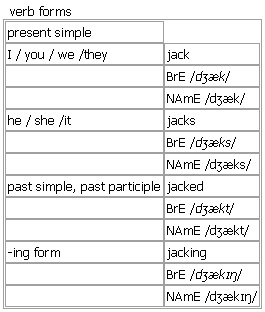 jack
jack

jack [jack jacks jacked jacking] noun, verb, adjective BrE [dʒæk] NAmE [dʒæk]
noun
1. countable a device for raising heavy objects off the ground, especially vehicles so that a wheel can be changed
2. countable an electronic connection between two pieces of electrical equipment
3. countable (in a ↑pack of cards)a card with a picture of a young man on it, worth more than a ten and less than a queen
•the jack of clubs
4. countable (in the game of ↑bowls)a small white ball towards which players roll larger balls
5. jacksplural a children's game in which players ↑bounce a small ball and pick up small metal objects, also called jacks, before catching the ball
6. (also jack ˈshit, taboo)uncountable (NAmE, slang) (usually used in negative sentences)anything or nothing at all
•You don't know jack.
see also ↑blackjack, ↑flapjack, ↑Union Jack
more at I'm all right, Jack at ↑all right adj., all work and no play (makes Jack a dull boy) at ↑work n.
Word Origin:
late Middle English: from Jack, familiar form of the given name John. The term was used originally to denote an ordinary man, also a youth (mid 16th cent.), hence the ‘knave’ in cards and ‘male animal’. The word also denoted various devices saving human labour, as though one had a helper (sense 1, and in compounds such as ↑jackhammer and ↑jackknife); the general sense ‘labourer’ arose in the early 18th cent. and survives in ↑lumberjack, ↑steeplejack, etc. Since the mid 16th cent. a notion of ‘smallness’ has arisen, hence senses 4 and 5.
Idiom: ↑jack of all trades
Derived: ↑jack in something ▪ ↑jack off ▪ ↑jack somebody around ▪ ↑jack something in ▪ ↑jack something up ▪ ↑jack up
verb ~ sth | ~ sb (for sth) (NAmE, informal)
to steal sth from sb, especially sth small or of low value
•Someone jacked my seat.
Verb forms: 
Word Origin:
late Middle English: from Jack, familiar form of the given name John. The term was used originally to denote an ordinary man, also a youth (mid 16th cent.), hence the ‘knave’ in cards and ‘male animal’. The word also denoted various devices saving human labour, as though one had a helper (sense 1, and in compounds such as ↑jackhammer and ↑jackknife); the general sense ‘labourer’ arose in the early 18th cent. and survives in ↑lumberjack, ↑steeplejack, etc. Since the mid 16th cent. a notion of ‘smallness’ has arisen, hence senses 4 and 5.
adjective not before noun ~ of sb/sth (AustralE)
tired of or bored with sb/sth
Word Origin:
late Middle English: from Jack, familiar form of the given name John. The term was used originally to denote an ordinary man, also a youth (mid 16th cent.), hence the ‘knave’ in cards and ‘male animal’. The word also denoted various devices saving human labour, as though one had a helper (sense 1, and in compounds such as ↑jackhammer and ↑jackknife); the general sense ‘labourer’ arose in the early 18th cent. and survives in ↑lumberjack, ↑steeplejack, etc. Since the mid 16th cent. a notion of ‘smallness’ has arisen, hence senses 4 and 5.
See also: ↑jack shit
|
|
